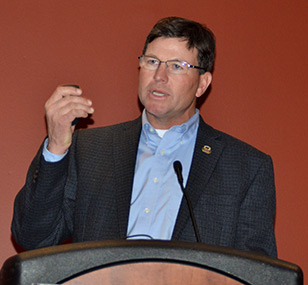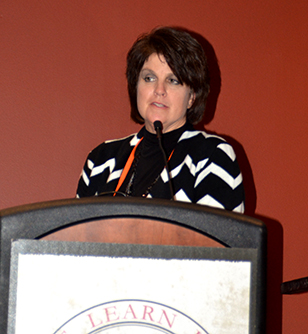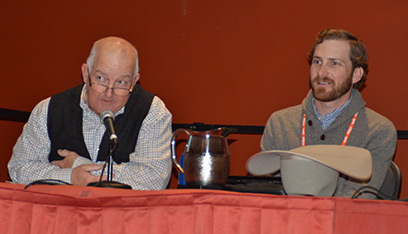Building for the Future
Agriculture’s next generation relies on positive working relationships.
SAN ANTONIO, Texas (Feb. 4, 2015) — Getting started in the cattle business, whether you are starting from scratch or transitioning with family, is rarely an easy process.
 Kevin Yon and his wife, Lydia, detailed their journey from managing a herd for someone else to owning their own purebred Angus operation in Ridge Spring, S.C.
Kevin Yon and his wife, Lydia, detailed their journey from managing a herd for someone else to owning their own purebred Angus operation in Ridge Spring, S.C.A producer panel hosted Feb. 4 during the 2015 Cattlemen’s College® at the Cattle Industry Convention & NCBA Trade Show shared techniques for maintaining successful relationships on the ranch, including four things first-generation cattle producers must have — priorities, a plan, persistence and patience.
“If you do those things, and you love the land and the people, then you will be very successful in this business,” Kevin Yon said.
He and his wife, Lydia, detailed their journey from managing a herd for someone else to owning their own purebred Angus operation in Ridge Spring, S.C.
They built Yon Family Farms from the ground up, and today sell more than 100 bulls across the southeast. Kevin says in order to be successful, young producers need to choose a product that is easy to sell. For them, it’s registered-Angus bulls to commercial cattlemen.
Their ultimate goal was that if any of their children wanted to come back to the farm, the farm would have the framework in place to allow that. Son Drake has joined the operation, and Corbin and Sally have both expressed a desire to come back.
 Kevin and Lydia told their children that, before returning to the operation, they first needed to leave for at least four years to gain outside experiences to bring back home to the operation.
Kevin and Lydia told their children that, before returning to the operation, they first needed to leave for at least four years to gain outside experiences to bring back home to the operation.Kevin and Lydia told their children that, before returning to the operation, they first needed to leave for at least four years to gain outside experiences to bring back home to the operation.
“I am just as proud that my children want to come back and be involved in agriculture as I would’ve been if they wanted to be a doctor or a lawyer,” Kevin said, pointing to the opportunities available in the beef business. “It’s a refreshing time to be in our industry.”
One of the young producers featured in the documentary Farmland, Brad Bellah of Throckmorton, Texas, and his family come from a long tradition of cattle ranching. The R.A. Brown ranch was established in the 1890s. After pursuing opportunities off the ranch, Brad decided that was the only place he needed to be.
Brad’s father, Jody, says each cattle operation is different, and there is more than one way to do things, but he outlined several things to consider before the next generation returns home.
It starts with the finances. Analyzing the operation’s cash flow to determine whether it can support several families, and changing the plan accordingly, he said, are very important. It is never too soon to start thinking about estate planning and a proper succession plan, he added.
When Brad decided to return home to the ranch full-time, he told his dad that he didn’t want any opportunities that weren’t also extended to his brother or sister. His dad responded: “We are going to be fair, but that may not always be equal.”
 When Brad Bellah (right) decided to return home to the ranch full-time, he told his dad Jody (left) that he didn’t want any opportunities that weren’t also extended to his brother or sister. His dad responded: “We are going to be fair, but that may not always be equal.”
When Brad Bellah (right) decided to return home to the ranch full-time, he told his dad Jody (left) that he didn’t want any opportunities that weren’t also extended to his brother or sister. His dad responded: “We are going to be fair, but that may not always be equal.”He also encouraged parents to remember that their children are adults, and even though they raise them, they need to treat them as valued partners in the operation. Communication is key, and showing respect to all members of the team is critical in all circumstances.
“It all boils down to the jobs we have to do,” Jody said. “I’ve always tried to do more than my share of work, but I am getting to the point where my share isn’t as big.”
Brad said that one way to make the transition easier on the next generation is to help them find ways to supplement their income. There are many needs to be met in rural communities, he said, encourage the younger generation to not be afraid to look outside of agriculture to find those opportunities you need to be financially secure.
Both families agreed the basic golden role goes a long way, both on and off the ranch: treat others the way you want to be treated.
Editor’s Note: The articles used within this site represent a mixture of copyrights. This article was written by staff or under contract for the Angus Journal. If you would like to reprint or repost this article, you must first request permission of the Angus Journal by contacting the editor at 816-383-5200; 3201 Frederick Ave., Saint Joseph, MO 64506. The Angus Journal claims copyright to this website as presented. We welcome educational venues and cattlemen to link to this site as a service to their audience.

